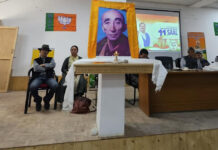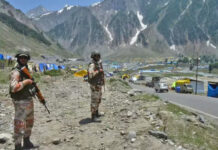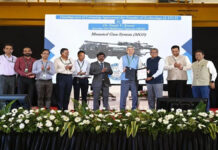The union government is looking for candidates to take over as lieutenant governors (L-Gs) of the Union Territories (UTs) of Jammu and Kashmir (J&K) and Ladakh, carved out following J&K’s reorganisation that will come into effect on October 31, according to people aware of the developments. There has been speculation that J&K governor Satya Pal Malik, 73, could preside over both UTs–J&K and Ladakh–even as the J&K Reorganisation Act provides for separate L-Gs for both UTs. One of the persons cited above said that Malik is likely to take over as an interim L-G until the Centre names L-Gs for the two UTs. “There has been some discussion on who will be best suited for the position; whether it will be a politician or a former bureaucrat. The final decision will, however, be taken by the Prime Minister’s office in consultation with the [Union] home and defence ministries,” said a Bharatiya Janata Party (BJP) functionary. The functionary added there has been no formal communication with Malik in this regard but he has had meetings with Prime Minister Narendra Modi and Union home minister Amit Shah in New Delhi. A second person familiar with developments said that Malik has gained some experience in governing J&K since August 2018 when the coalition government of the People’s Democratic Party and the BJP collapsed in the state. “There is a possibility that for the sake of continuity, he [Malik] could be appointed the L-G. Since the powers of the L-G and the governor are the same, it is a matter of semantics… being appointed as L-G will not be a demotion for him [Malik],” said the second functionary on condition of anonymity. When asked whether Ladakh will get a separate L-G, the second functionary quoted above said that there is no clarity on the issue. “The Act provides for two L-Gs, but it is possible that one person will be given charge for both,” the second functionary said. As per the J&K Reorganisation Act, which paved the way for the state’s bifurcation in August, J&K will be a UT like Puducherry, which has a legislative assembly and a council of ministers. All the bills that the J&K assembly will pass will have to be sent to the L-G for consent, according to the Act. The L-G can give his assent to a bill, withhold it or send it for the president’s consideration. The Centre also effectively revoked the Constitution’s Article 370, which gave J&K a special status, in August besides reorganising the state. Hundreds of people, including former chief ministers Farooq Abdullah, Omar Abdullah and Mehbooba Mufti, were arrested ahead of the change in J&K constitutional status. A lockdown and communications blackout was also imposed to prevent protests against the move. Most of the restrictions have since been eased. The seat of J&K government will move from Srinagar, the summer capital, to Jammu for the next six months a day after the reorganisation will come into effect. The allocation of police and administrative officials will follow. “After the reorganisation, the police will be under control of the [Union] home ministry. What also remains to be seen is whether the present set of advisors [to Malik] will be retained or not,” the first functionary quoted above said. K Vijay Kumar, a former Indian Police Service officer who headed the Special Task Force that killed most-wanted sandalwood smuggler Veerappan in 2004 in Tamil Nadu, is among Malik’s advisors. The other advisors include Khurshid Ganai, K K Sharma and K Skandan, all former bureaucrats, and Farooq Khan, a former police inspector general.

Dogra Herald is the media of J & K, breaking language and geographical barriers, connecting J & K to the rest of India.
0191 245 4946
info@dograherald.com
Latest articles
COVID-19: 29 more deaths, 2,256 new cases in Jammu and Kashmir
iamjkstarr - 0
SRINAGAR: The COVID-19 death toll in Jammu and Kashmir rose to 3,870 on Sunday with 29 more fatalities, while 2,256 new cases...
LG India marks 26 glorious years with exclusive Republic Day offers
DOGRA HERALD BUREAUrajouri, Jan 30LG Electronics, one of the leading consumer durable brands in India, launched the special campaign “26 Years of...
COVID19: Situation scary, says Dir SKIMS ‘Next 2 weeks will give clear picture’
iamjkstarr - 0
Director SKIMS, A G Ahanger Sunday said the situation was “grim” in Kashmir and next two weeks would provide a clear picture whether the...


























